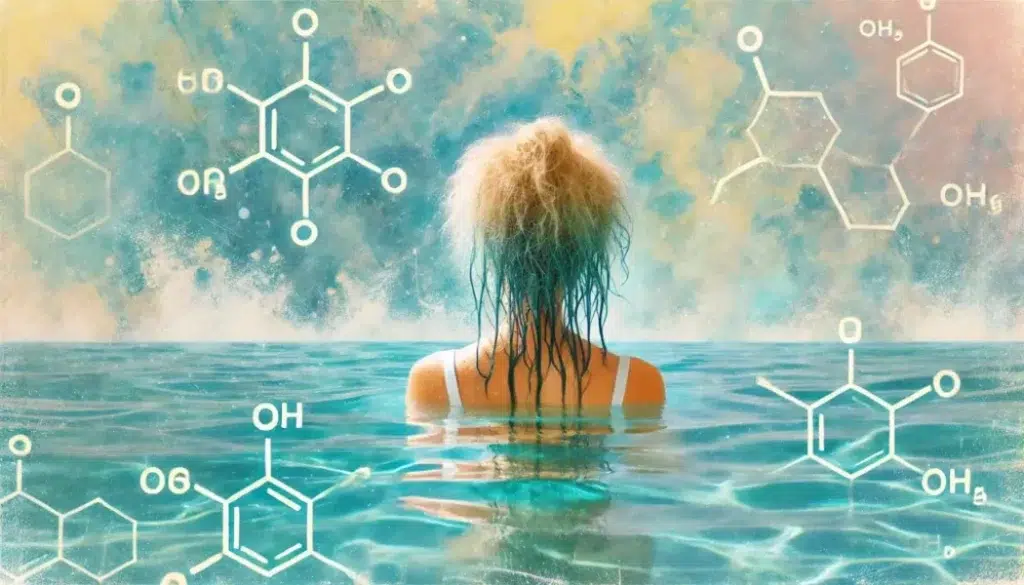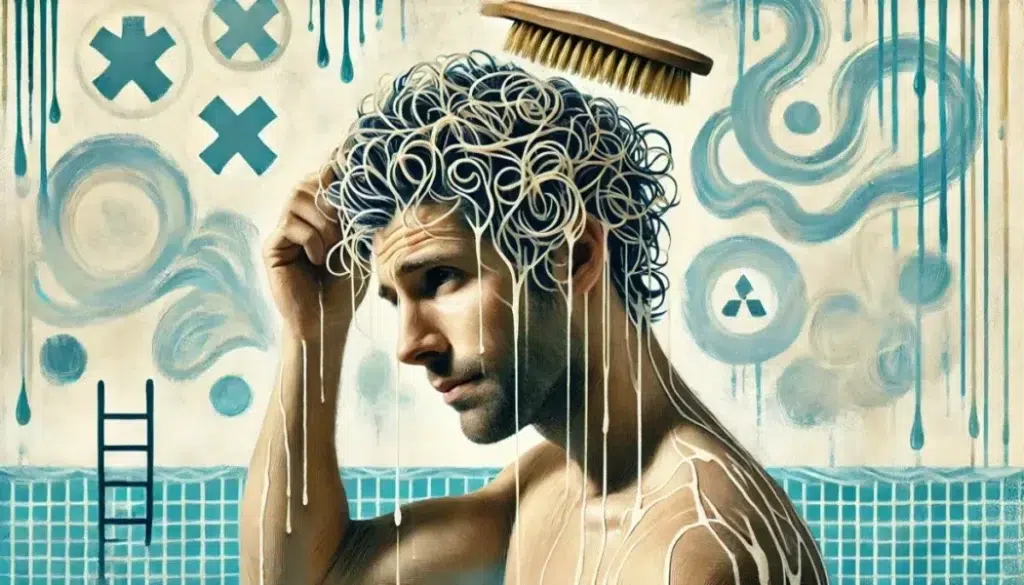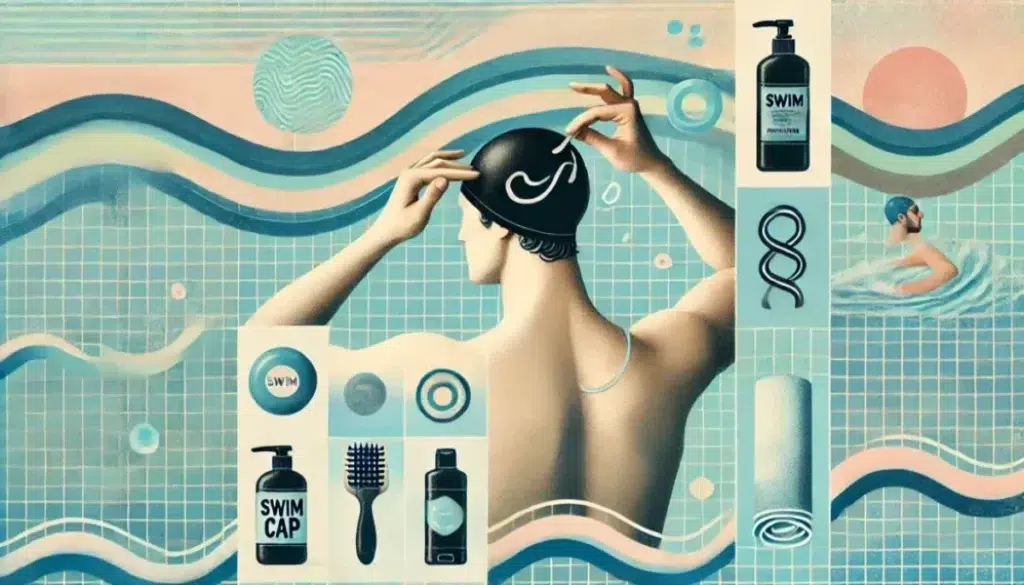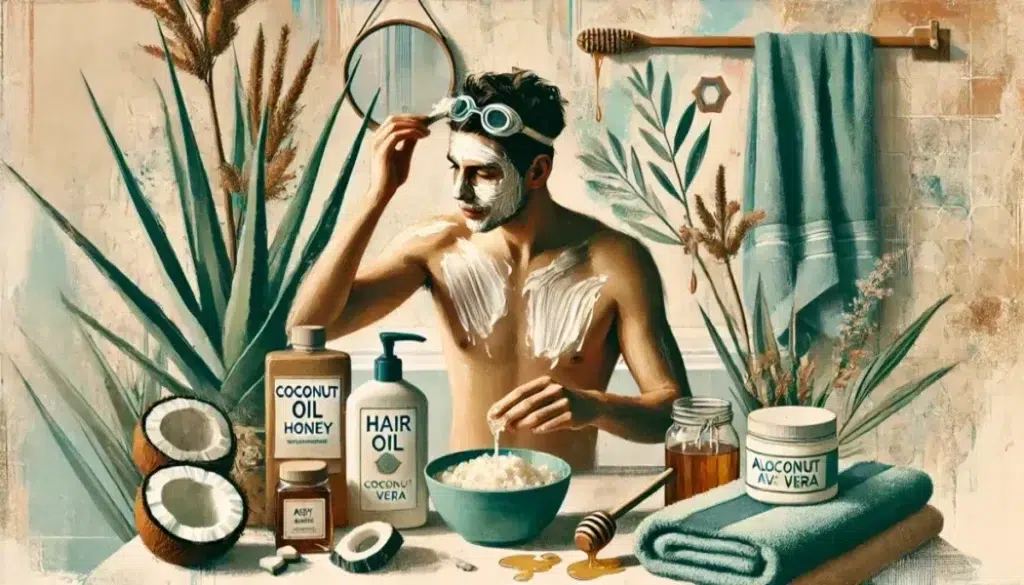Chlorine makes a pool safe for swimming, but it’s not doing your hair any favors. Hanging out in chlorinated water means your hair is soaking up chemicals which can mess up its natural state. These chemicals, chlorine being the main culprit, can strip your hair of its natural oils, making it dry and brittle. Dry hair may not sound like a big deal, but over time, it can lead to serious breakage.

When you’re hitting the pool often, the exposure to chlorine builds up. We’re talking about dry, weakened hair that’s much more prone to break and split. It’s like you took a bunch of mini scissors and went to town on your hair, not the trendy kind of town either.
Got colored or treated hair? Heads up because chlorine can be even harsher here. It can speed up color fade making all that salon investment a bit of a bummer. It weakens the hair cuticle, which means less protection against the harsh chlorine—a scary thought for those with already delicate or chemically altered hair.
So, while swimming in a pool is great for your health, for your hair, it can spell trouble if you’re not careful. Swimming should be fun, not a hair-care headache.
🧪 Recognizing the Signs of Chlorine-Damaged Hair
After a good swim, that coarse, straw-like texture of hair can be a major giveaway of chlorine damage. Chlorine can latch onto your hair, leaving it rough and fragile. The chemicals mess up the outer layer of each strand, turning smooth hair into something resembling a frizzy broomstick.

But the bad news doesn’t stop at surface-level changes. Chlorine can sneak its way into the hair shaft, weakening it from the inside out. This weakening process can cause your strands to lose their grip, leading to an increased chance of hair fallout. If you’re noticing more hair in your brush than usual, the pool could be part of the problem.
For those rocking sensitive scalps, chlorinated water can cause additional discomfort. Besides drying out the hair, the scalp may become irritated and itchy, creating an urge to scratch which isn’t doing hair health any favors. This irritation can escalate if left unaddressed, making swimming the source of all sorts of hair woes.
🏊♂️ Best Practices for Protecting Hair from Pool Water
Before jumping into the pool, consider some pre-swim rituals that can help protect the hair. The key here is to saturate your hair with fresh water before swimming so it absorbs less chlorine. Following up with a leave-in conditioner creates a protective layer, keeping out the nasty stuff.
For the ultimate shield, a swim cap can do wonders. While it might not be everyone’s favorite fashion statement, a good quality swim cap significantly reduces hair’s contact with pool water, cutting down on damage. Plus, it’s a fun opportunity to match your suit in style.

Once pool time is over, how you treat your hair matters a lot. Rinse thoroughly with fresh water as soon as possible to wash out any lingering chlorine. Using a gentle shampoo designed to remove residue helps keep your hair clean without over-stripping it.
Conditioning post-swim is non-negotiable to bring back moisture and softness. Go for a deep conditioner that’s big on hydration to help fight the dryness pool chemicals love to leave behind. More moisture equals happier hair, and happier pool days.
💧 Restorative Hair Care for Swimmers
Now that you’ve embraced all those savvy pre- and post-swim strategies, let’s talk recovery. For hair that’s feeling the chlorine pinch, some at-home care can work wonders. Whipping up DIY masks with natural ingredients like coconut oil, honey, or yogurt can help rejuvenate stressed strands. These ingredients are not just pantry stars; they’re superstars for restoring moisture and shine.
Products designed to address chlorine damage are also your best friend. When you’re shopping, hunt for clarifying shampoos to give your hair a thorough cleanse from the stubborn chemical residue. Moisturizing conditioners that focus on hydration are equally important for keeping your hair soft and touchable.

People with sensitive scalps need to be extra gentle. Opt for products labeled for sensitive skin, and try out scalp masks with soothing ingredients like aloe vera or chamomile. They calm the irritation, reducing the itchiness and tender fee.
Consistency is key here. Regularly pampering your hair with the right treatments ensures that pool time stays fun without turning into a hair nightmare. Embrace those pool days with the peace of mind that your hair has got the support it needs for health and style.
Stay with us — the best is yet to come.
By following our advice, you’re doing the most you can for your hair.
Be the first to know when we publish new guides, tests, and proven strategies for stronger, healthier hair.
👉 Visit the About Me page to learn more about my journey, mission, and why helping people with hair health is so personal to me.
Want healthier, stronger hair? Discover 8 science-backed habits that protect your scalp and boost natural growth. Get your free PDF guide today!
Disclaimer: This article is for informational purposes only and is not a substitute for professional medical advice. Sensitive claims are supported with scientific references, and full product details can always be found on the official websites of the respective manufacturers or distributors.
Some links in this article are affiliate links. If you choose to make a purchase through them, I may earn a small commission at no extra cost to you — helping me keep HairGrowGenius running. Thank you for your support!

✅ FAQ – How Swimming in a Pool Affects Hair Health and Hair Loss
❓ Does chlorine cause permanent hair damage?
Chlorine doesn’t usually cause permanent damage, but repeated exposure can lead to dryness, brittleness, and increased breakage. Over time, this weakens the hair shaft, especially if you don’t rinse or protect your hair after swimming.
❓ Can swimming in a pool trigger hair loss?
Swimming itself doesn’t cause hair loss, but chlorine and other pool chemicals can irritate the scalp and weaken hair strands. This may lead to increased breakage or temporary shedding, especially in people with preexisting scalp sensitivity or damaged hair.
❓ Is it better to wet your hair with fresh water before entering the pool?
Yes. Pre-wetting your hair with clean water helps reduce chlorine absorption, like filling a sponge before it hits bleach. It’s one of the easiest and most effective ways to protect your hair while swimming.
❓ Do swim caps actually protect your hair from chlorine?
Swim caps help reduce direct exposure, but they’re not completely waterproof. They work best when used with pre-swim rinsing and post-swim care. Think of them as an added layer of defense—not a force field.
Last updated: June 2025 based on latest research


Leave a Reply